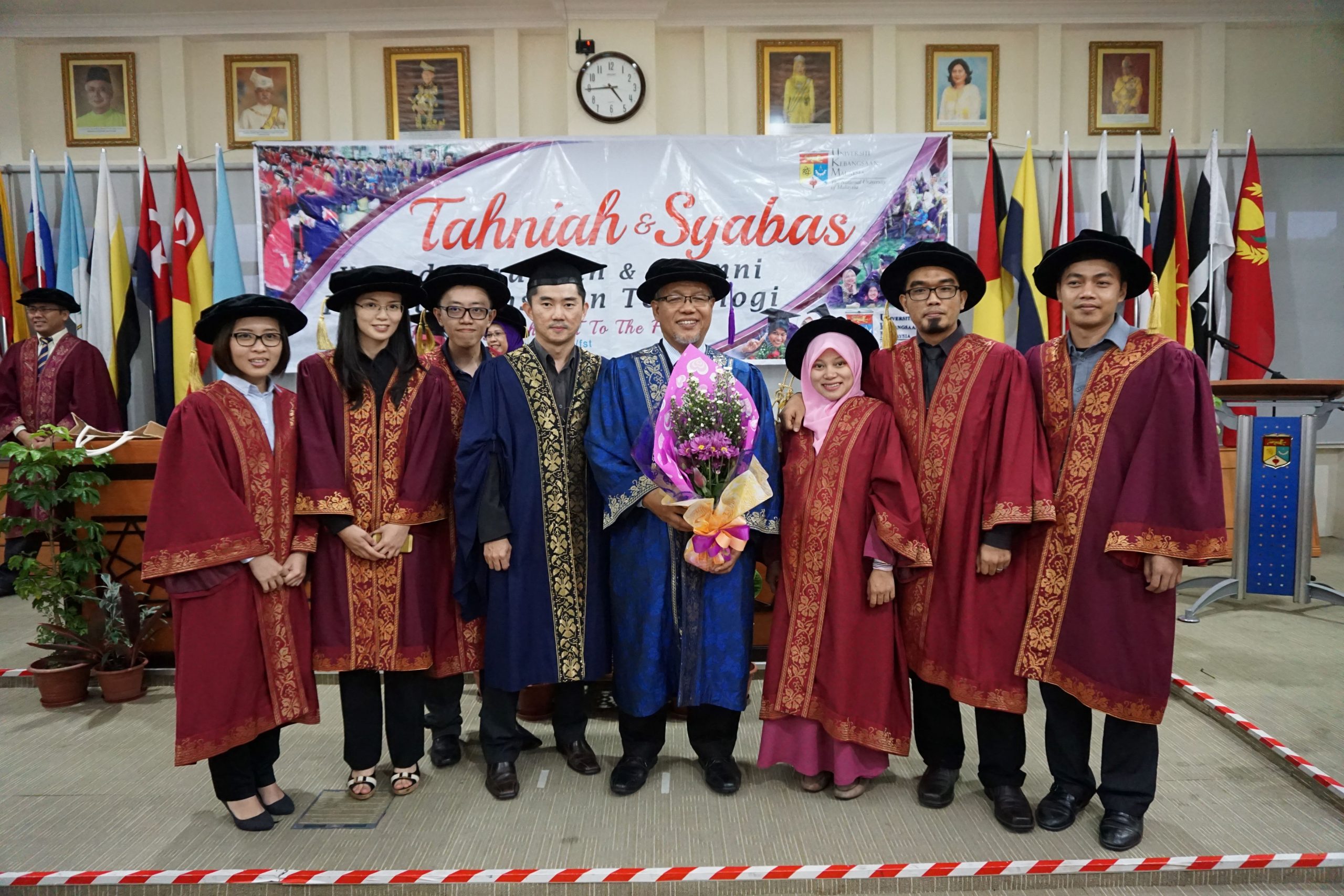微波水解High Yield Production of Sugars from Deproteinated Palm Kernel Cake under Microwave Radiation via Dilute Sulfuric Acid Hydrolysis

祝贺Miss Suet-Pin Fan (left 1, 范学彬小姐-左一)博士顺利答辩 succesfully passed her defence of dissertation on 27th Jan 2015
High Yield Production of Sugars from Deproteinated Palm Kernel Cake under Microwave Radiation via Dilute Sulfuric Acid Hydrolysis
Climate change together with the increased concern for the energy security has imparted a trend shifting on the use of fossil fuels to renewable energy sources. Worldwide attention has been focused on the transforming of agricultural waste into high value-added products. Malaysia, one of the global leading palm oil producers, seeking a next catalyst for sustaining economic growth since the palm oil production has reached a mature stage. Palm kernel cake (PKC), one of the main by-products from palm oil industry, is rich in protein (14.5 – 19.6%) and mannan (35.2%).It should be put under the spotlight and revolutionize into a source of revenue for oil palm industry. PKC composes of high carbohydrate contents, mainly hexoses such as mannose, glucose and galactose, which are the promising candidates for the production of bioethanol through fermentation by microorganism.
In Malaysia, approximately 2.39 million tons of palm kernel cake (PKC) was produced from palm oil mill annually. It consists of high carbohydrate contents, especially mannan (~35%). But, it was an under-utilized co-product of palm oil milling industry. Therefore, it is beneficial to amplify the potential applications for this biomass.
Miss Suet-Pin Fan, a PhD student, co-supervised by Dr. Chin-hua CHIA (National University of Malaysia) and Prof. Zhen FANG (Biomass Group, Xishuangbanna Tropical Botanical Garden, CAS) successfully used deproteined palm kernel cake as raw material for the production of monosaccharide under microwave radiation via dilute sulphuric acid hydrolysis.
In this work, it is the first time to systematically study the production of monosaccharides from deproteinated PKC (DPKC) via dilute sulfuric acid hydrolysis in a well-controlled microwave by response surface approach. DPKC under optimal operating conditions [170 °C, 0.181 N H2SO4and substrate to solvent ratio (SS ratio), 1:40] offered a striking conversion with maximum yield of 77.11% of total monosaccharide in a reaction time period as short as 6 min 6 s and maximum mannose yield 92.11% obtained at 148 °C, 0.75 N H2SO4, 10 min 31 s and SS ratio of 1:49.69. From the results achieved in this study, it can be conclude that microwave-assisted hydrolysis is an efficient method in transforming the DPKC, an economically and environmentally benign source of fermentable carbohydrate into biofuels such as, 2,3-butanediol and hydrogen.
The study entitled “High Yield Production of Sugars from Deproteinated Palm Kernel Cake under Microwave Radiation via Dilute Sulfuric Acid Hydrolysis” has been published in Bioresource Technology, 2014, 153: 69-78,
http://www.sciencedirect.com/science/article/pii/S0960852413017719
———————————————————————————————–
微波辐射下脱蛋白棕榈仁饼稀硫酸水解高产糖
气候变化加上对能源安全的日益关注,使化石燃料的使用趋势转向可再生能源。全世界的注意力都集中在将农业废物转化为高附加值产品上。马来西亚是全球领先的棕榈油生产国之一,自棕榈油生产达到成熟阶段以来,一直在寻求下一个维持经济增长的催化剂。棕榈仁饼(PKC)是棕榈油工业的主要副产品之一,富含蛋白质(14.5-19.6%)和甘露聚糖(35.2%)。它应该成为人们关注的焦点,并彻底改变油棕榈行业的收入来源。PKC由高碳水化合物组成,主要是甘露糖、葡萄糖和半乳糖等己糖,是微生物发酵生产生物乙醇的有前景的候选者。
在马来西亚,棕榈油厂每年生产约239万吨棕榈仁饼(PKC)。它由高碳水化合物含量组成,尤其是甘露聚糖(~35%)。但是,它是棕榈油加工业未充分利用的副产品。因此,扩大这种生物质的潜在应用是有益的。
在马来西亚国立大学Chin-hua CHIA(谢振华)博士和CAS西双版纳热带植物园生物质组方真教授的共同指导下,博士生Suet-Pin Fan(范学彬)小姐成功地将脱蛋白棕榈仁饼作为原料,在微波辐射下通过稀硫酸水解制备单糖。
在这项工作中,首次通过响应面方法系统研究了在受控微波中通过稀硫酸水解脱蛋白PKC(DPKC)生产单糖的过程。在最佳操作条件[170 °C,0.181 N H2SO4和底物与溶剂比(SS比)1:40]下,DPKC提供了惊人的转化率,在短至6 min 6 s的反应时间内,总单糖的最大收率为77.11%,在148°C,0.75 N H2SO4,10 min 31 s和SS比为1:49.69的条件下,甘露糖的最大收率达到92.11%。从这项研究的结果可以得出结论,微波辅助水解是一种将DPKC转化为生物燃料(如2,3-丁二醇和氢气)的有效方法,DPKC是一种经济和环境友好的可发酵碳水化合物来源。
题为“High Yield Production of Sugars from Deproteinated Palm Kernel Cake under Microwave Radiation via Dilute Sulfuric Acid Hydrolysis”已发表在《生物资源技术》2014年第153期第69-78页:
http://www.sciencedirect.com/science/article/pii/S0960852413017719